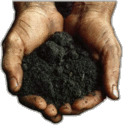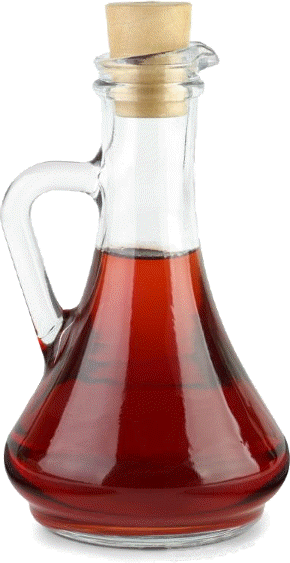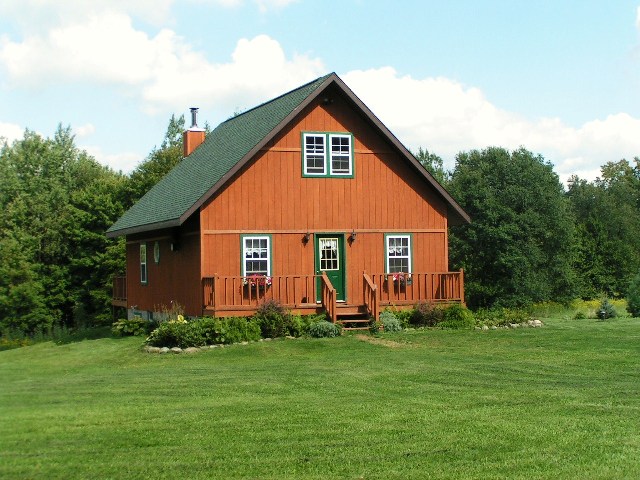
Amending Your Soil
by Raquel Akens
IN our last article, we discussed the role of soil pH in gardening. Having the proper soil pH for the plants growing there makes a huge difference in the growth and nutrition of the resulting crops. In this article we will discuss some methods for adjusting soil pH.
It is commonly observed that soils in the east coast have a low pH, or tend to be in the acidic range, while the soils in the mid-west and southwestern areas tend to have high pH, or are alkaline. If a soil receives a lot of rainfall, it is most likely in the acidic range; while soils with high concentrations of clay tend to be alkaline. Although, it is very helpful to have an exact figure for the pH of your soil through the use of Soil test kits, it is not necessary. Here is a simple way to easily check your soil’s pH:
 Scoop about 1/4 cup of soil from
four
different spots in your garden. Mix the soil samples together well,
then scoop a 1/4 cup of soil from the mixture, and place it in a
clean container (like a glass jar), and moisten the soil with an 1/8
cup of pure/distilled water. If you want to test your soil for
Scoop about 1/4 cup of soil from
four
different spots in your garden. Mix the soil samples together well,
then scoop a 1/4 cup of soil from the mixture, and place it in a
clean container (like a glass jar), and moisten the soil with an 1/8
cup of pure/distilled water. If you want to test your soil for acidity: add a mixture of 1 tablespoon of baking soda with 2
tablespoons of distilled water to the glass jar. If the soil begins
to bubble or fizz, then your soil is acidic. To test your soil for
alkalinity: instead of baking soda, add two
tablespoons of vinegar to
the glass jar, and if it begins to bubble or fizz then your soil is
alkaline.
acidity: add a mixture of 1 tablespoon of baking soda with 2
tablespoons of distilled water to the glass jar. If the soil begins
to bubble or fizz, then your soil is acidic. To test your soil for
alkalinity: instead of baking soda, add two
tablespoons of vinegar to
the glass jar, and if it begins to bubble or fizz then your soil is
alkaline.
Drastic pH changes should be avoided, whether your soil is too alkaline or too acidic. When there is a quick, dramatic change in the soil’s pH, it causes a disturbance in the environment of the microorganisms within the soil, and a resulting loss of beneficial bacteria. It is also good to keep in mind that soil pH can vary around half a point (0.5) over the space of a year. During the summer soil tends to be more acidic, because of increased bacterial activity.
Acid Soils – When dealing with acidic soils, the addition of calcitic limestone, (a mineral usually found in white powder form) proves helpful in neutralizing the pH of the soil, and it adds calcium to the soil. Dolomitic limestone works similarly, but adds magnesium. Therefore, soils with an abundance of magnesium should avoid the use of dolomitic limestone. A good quality limestone will have the highest amounts of calcium and magnesium in very fine particles. The fine particles allow the limestone to work both more effectively and rapidly in the soil. Remember – the use of limestone will take a year or more before a perceivable change is present. Wood ashes can also be used to raise soil pH, although a limit of 2 pounds of ashes per 100 square feet of soil per year is recommended. This is because wood ashes are high in potassium, and its overuse causes an overabundance of potassium in the soil, resulting in magnesium and possibly calcium deficiency in the plant, because high potassium levels interfere with the plant’s ability to absorb calcium and magnesium.
Alkaline Soils – Soils with a high pH are more complicated than acidic soils. The use of acidifying minerals, like elemental sulfur, can be a problem, because of the salt produced by the reaction of the alkaline and acid materials. Alkaline soils themselves tend to have a high salt content, and so the additional salt can easily result in toxic levels for any plants to grow in. Soil that is very salty may be easily recognized by the white crust on its surface. Most crops will simply not grow in this kind of soil. One of the reasons being that the concentration of salt does not allow for adequate uptake of water by the plant’s roots. Another reason is that some salts are simply too toxic for living organisms and plants to live. The best course to take for alkaline soils is to regularly apply organic matter (compost) to the soil. Beware of high salt content in any soil amendments you may use. Amendments that contain manures and/or bio-solids (treated sewage sludge) are high in salt, while purely plant based amendments are low in salt, which makes them the best choice for saline/alkaline soils. Pine needles, peat moss, bark mulch, and leaf mould are all organic components that lower pH. Mulching a very thick layer of organic matter has also proven an effective way to add organic content to the soil. However, this process requires time for the plant matter to attract microbes, earthworms, and buggies which break it down into soil, and make it available for plant uptake.
~ Raquel Akens
Sources:
* The Impact of Salinity Stress, by Dr. Rana Munns, CSIRO Division of Plant Industry Canberra ACT, Australia.
http://www.plantstress.com/articles/salinity_i/salinity_i.htm
* SULIS University of Minnesota, Modifying Soil pH:
http://www.sustland.umn.edu/implement/soil_ph.html
* Acid-loving Plant Care, by Sheena Adams:
http://www.bcliving.ca/garden/acid-loving-plant-care
* http://water.epa.gov/powaste/wastewater/treament/biosolids/genqa.cfm
* http://www.grow-it-organically.com/changing-soil-ph.html
* http://link.springer.com/content/pdf/10.1007%2Fs13762-013-0201-8#page-1
“And God said, Behold, I have given you every herb bearing seed, which [is] upon the face of all the earth, and every tree, in the which [is] the fruit of a tree yielding seed; to you it shall be for meat” (Gen. 1:29).
Have you thought about the fact that aside from our committment to Christ, there is one choice which can bring the greatest happiness into our lives, but is also the most restrictive experience that any human being can voluntarily assume in this world.
The Lunar Sabbath - Part 2
Is the 7 day weekly cycle an assumption? Some claim that it is!
Gardening - Amending Your Soil
Understanding the role of soil ph in your garden.
Health Corner - Supplements & Their Sources pt 1
You could be consuming something that you think is healthy, when it could be contributing to disease and even the very problem you are trying to avoid.
World Reports
Report from Uraguay and Brazil. Seventh Day Home Church Fellowships recently funded the travel of a brother to South America for a missionary visit there.
Upcoming Events
Find out what events are happening in the near future
Think on These Things
These two things are often divorced by religionists, but they can not rightly be separated
Recipe
Raquel's Easy Fat-Free Garbanzo Patties
Seventh Day Home Church Fellowships is an association of Sabbath-keeping groups, which through web & tele-conferencing provides means for study, fellowship, and jointly organized missionary projects.
Website: www.seventhdayhomechurchfellowships.org
Email: admin@seventhdayhomechurchfellowships.org
Seventh Day Home Church Fellowships:
P.O. Box 33, Lookout, CA 96054, U.S.A.
